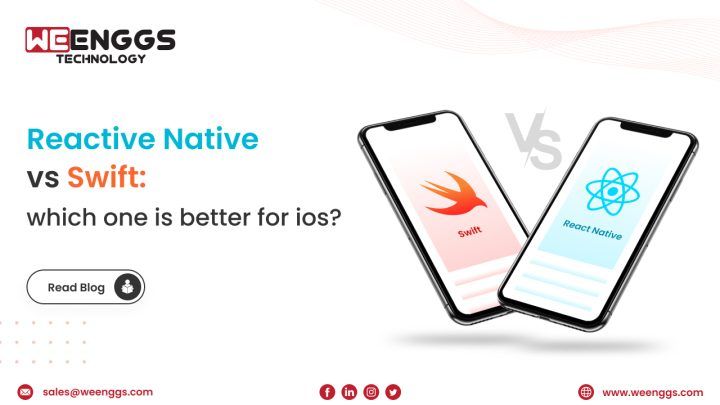When it comes to iOS app development, choosing the right framework is a crucial decision that can significantly impact the success of your project. Two popular options are React Native and Swift.
In this blog, we’ll delve into the strengths and weaknesses of each framework to help you make an informed choice.
React Native: The Cross-Platform Challenger
Pros of React Native:
- Cross-Platform Compatibility: React Native allows you to write code once and use it for both iOS and Android platforms, saving time and effort in development.
- Large Community and Ecosystem: React Native benefits from a vast and active community, offering a wealth of open-source libraries, plugins, and resources to streamline development.
- Hot Reloading: This feature enables developers to see the results of their code changes instantly, making the development process more efficient.
- Reusable Components: React Native allows you to build reusable UI components, which can speed up development and ensure consistent design.
- Code Sharing: A significant advantage is sharing code between web and mobile applications if you’re using React for web development.
Cons of React Native:
- Performance: While React Native’s performance has improved over time, it may not match the native performance of Swift, particularly in graphics-intensive or CPU-heavy apps.
- Limited Access to Native APIs: Some advanced or niche features may require native modules or custom native code, which can be time-consuming to implement.
- Larger App Size: React Native apps can be larger in size compared to native apps due to the need for a JavaScript runtime.
- Complex Navigation: Implementing complex navigation can be challenging in React Native compared to native iOS development.
Swift: The Native Powerhouse
Pros of Swift:
- High Performance: Swift is a compiled language designed for iOS, which means it offers superior performance, especially in graphics-intensive or CPU-heavy apps.
- Access to Native APIs: Swift provides full access to iOS native APIs and libraries, making it the ideal choice for apps that require deep integration with iOS features.
- Optimized for iOS: Swift is optimized for iOS, ensuring smooth animations, responsiveness, and a seamless user experience.
- Robust Tooling: Xcode, Apple’s official IDE for Swift, offers a comprehensive suite of tools for debugging, profiling, and testing, streamlining the development process.
- Safety and Reliability: Swift’s syntax and compiler help catch errors at compile-time, reducing the likelihood of runtime crashes.
Cons of Swift:
- iOS-Exclusive: Swift is limited to iOS and macOS platforms, so you can’t reuse code for Android development.
- Learning Curve: Swift has a steeper learning curve, especially for developers new to iOS development or programming in general.
- Slower Development for Cross-Platform: If you need to develop for both iOS and Android, you’ll have to write separate codebases, which can be time-consuming and costly.
- Smaller Community: While Swift’s community is growing, it’s still not as extensive as React Native’s, which means fewer third-party libraries and resources.
Choosing the Right Framework
The choice between React Native and Swift depends on your specific project requirements:
Choose React Native if:
- You need to develop for both iOS and Android.
- Rapid development and code sharing are essential.
- You have a limited budget and resources.
- Your app’s performance requirements are not extremely high.
Choose Swift if:
- You’re focused exclusively on iOS development.
- Performance is a critical factor, especially for graphics-intensive apps.
- Deep integration with iOS features and libraries is necessary.
- You have the resources and time to dedicate to native development.
In summary, both React Native and Swift have their strengths and weaknesses. The choice ultimately depends on your project’s specific needs, budget, and development expertise. Consider your priorities carefully to select the framework that aligns best with your iOS app development goals.
Weenggs Technology has an expert team of iOS app developers who can help you with the best and affordable solution for your business. Talk to us at sales@weenggs.com


